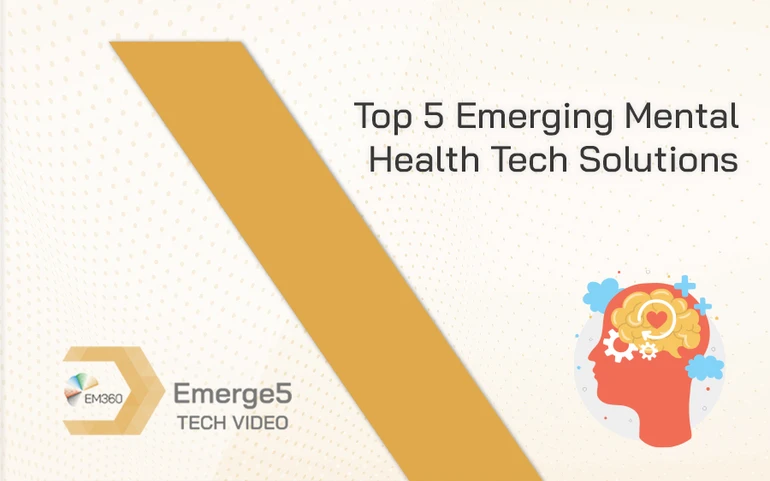
The past year has proven to be one of the most stressful years in modern tech history over 300,000 employees in the UK losing their job due to high strain on mental health. With COVID-19, home working, family stress, new adjustments to living, uncertainty about the future and an implementation of new work environments styles, there has been a severely damaging impact on people's wellbeing and mental health. It feels like at the moment we are never truly switched off, but it's important to understand the benefits that technology can bring to help us and not to hinder us.
Wearable Technology
Wearables have been around for a number of years now to track our physical wellbeing by tracking our workouts, heart rate, and step counter; but what about wearables that keep our mental state in check? If tech has already improved our physical health, one might wonder what wearable technology healthcare industries are establishing to improve psychological health.
Let's start with the Sentio Solutions option, Feel; an emotion-sensing wristband combined with an app that provides real-time monitoring and personalized interventions for individuals with anxiety or depression. Sentio’s solution for Augmented Mental Health uses a combination of evidence-based behavioural techniques and the company’s proprietary emotion recognition technology.
Moodbeam is a wristwatch that automatically sends signals to users to indicate what level their mental health is at – yellow for “OK” and blue for “not OK" Linking to a smartphone application, Moodbeam gives an overview of “mood moments'', which aim to help users spot trends and patterns in their mental health over time. Then we have Flow Neuroscience – This Sweden-based medtech company is offering a new, medication-free, at home treatment for depression with a brain stimulation headset paired with an AI-powered app therapy program. The options are endless when it comes to wearables and I feel like we're just starting to see this space expand from the mental health perspective.
Workplace Wellbeing Tools
Thankfully, many organisations are now noticing the importance of mental wellbeing and are taking action, however there is still a sizeable minority of organisations that are not. They have a responsibility to look after you and, with so many great tools like Calm, Spill, and Perkbox at their disposal, they're on for an easy win. Also, there's great dedicated platforms such as Unmind that is underpinned by clinical psychology and powered by technology, the platform helps employees proactively measure, understand, and nurture their own mental health across seven core areas of wellbeing - fulfilment, coping, calmness, happiness, connection, health, and sleep. Unmind is empowering leaders to drive positive cultural change across their organisation by accessing aggregated and anonymised insights into the wellbeing of their people.
Mood Tracking Services
New technologies have been a complete blessing for millions of people worldwide, especially for those who suffer from mood swings or depression, because now they have access to some ground-breaking therapeutic apps. Sometimes it's not as easy as simply booking a therapy session to getting your problems sorted out; not everyone works the same, but thankfully mood tracking services are always available to engage with. Let's take Moodpath for example; a German app that asks questions everyday to evaluate a person's well-being and screen them for symptoms of depression. The app then periodically generates an electronic document with monitoring results. The user can then use this document for consultation with a healthcare professional.
AI and ML
AI can't replace human therapists, but it can support them. It can serve as a lifeline and an early warning system, being available for support 24/7. People can access it regardless of where they are in the world, which fills a gap for people who don't have access to the right resources. Another example, there's no blood test to see if you have a mental health condition but an ML algorithm could be the equivalent with a research-based "Objective" test that makes the need to seek treatment an evidence-based data and medical best practices. A US company called Clarigent Health developed a platform based on AI and machine learning (ML) to detect mental health conditions early-on. The platform acts as a clinical decision support tool providing medical staff with insights into suicide ideation and other mental health issues.
Video Games
Understanding your customer base is essential to creating a product that helps people and that is exactly what video game developers are doing. Let's take a famous example of a New Zealand created game called SPARX; it's a fantasy game that delivers cognitive behavioural therapy, packaged in a fun and appealing way. The acronym stands for "smart, positive, active, realistic and x-factor thoughts," strategies designed to fight depression. SPARX has shown to be more effective in treating teen depression than one-to-one counselling. About 44 percent of SPARX players recovered compared with 26 percent with counselling. We are also seeing an emergence of accessible game titles such as A Night in the Woods, Florence, Griss, Hellblade, and the list goes on.

